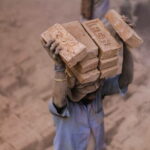By Sultan Shoab
GILGIT, Dec. 30(APP):Gilgit Baltistan is the most important area of Pakistan due to its geography and a beautiful landscape full of mountains with snow covered peaks and streams full of dancing waters and roaring rivers.
The beauty of the area is further enhanced by a variety of luxuriant fruits including cherry, apricot, apple, pears and peach orchards.
GB is one of the only places where all four seasons can be witnessed in their natural state; But ,despite the mind blowing beauty of the area, the winter season is really harsh in the mountains of Gilgit Baltistan. Mostly People stay indoors, and store food during the summer. Most of the people of Gilgit Baltistan use the locally-made wood stoves to cope with the harsh winter, and they have started preparing themselves for the severe weather conditions ahead as temperatures have started plunging here this week.
In extreme winter, that lasts from November to end of March, fire-wood stoves become a necessity of life. Mostly residents use different types of stoves for cooking and protecting themselves from the cold. But nowadays due to high price of fire- wood residents of GB look worried.
Nadeem Khan a resident of Gilgit konodas while talking to APP sought urgent attention of the government towards the problem,”High price of wood for heating purpose in market affects the routine life of the people of GB but we have no LPG or other source for heating purpose in Gilgit Baltistan”.
Shams Mir Advisor to Chief Minister GB while talking to APP said that “to cope with the winter season, government of GB has already taken practical steps, we have decided to provide Air- mix gas (LPG) plant to more than thirty-five thousand household consumers in district Gilgit in initial phase and all paper work has been completed”.
The people of mountainous Gilgit Baltistan region have adopted different methods for storage of food and fuel to cope with the harsh winters which brings down temperature below zero degrees Celsius for several months. One of the methods for preservation of food is known as Nasaloo, in Shina, a major regional language.
As part of the tradition of Nasaloo, households slaughter an animal “ yak, goat, sheep or oxen, based on availability and financial status, and hang the meat in an airy, cold, storage, to dry.
The dried meat is then cooked during the months of January and February, generally the coldest months in the region when most of the areas receive heavy snowfall.
This practice is prevalent across the Gilgit Baltistan and Chitral region, under different names.
Gilgit-Baltistan is among the top regions in the world with potential to generate maximum electricity, yet electricity shortfalls have become a routine across GB with some areas facing up to 20 hours of load shedding in winter.
Abdul Haleem resident of Gilgit said that “not only did the shortage of power affected routine life in the region, but business activities had suffered as well, damaging the region’s economy, People affiliated with the tourism in GB have lost their businesses to the problem, and people are now cutting trees to use as an alternate energy source, leading to increased deforestation”.
He called upon the government and political representatives of Gilgit Baltistan for provision of the basic necessities of life to common man especially in winter . Although resources are abundant in the valley but the proper utilization and quality of work matters,he maintained.






